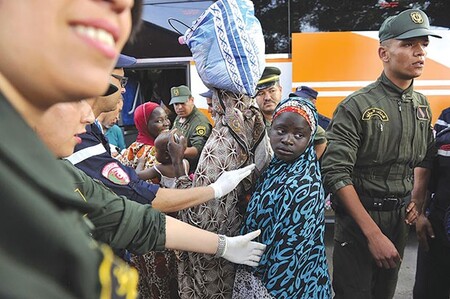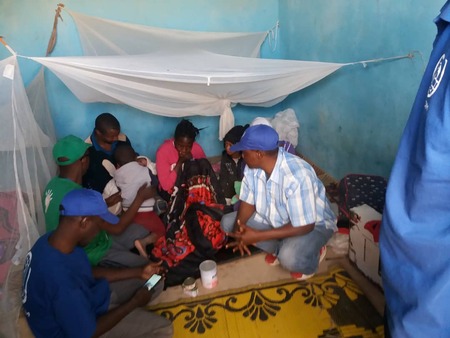Deportation convoys from October 2019 to January 2020
For the months of October 2019 to January 2020, Alarme Phone Sahara activists in the region of Agadez in Niger witnessed a continuation of large-scale deportations of citizens of different nationalities from Algeria to Niger.

Algerian security forces put migrant women on busses for deportation
©Louiza Ammi/Liberté
According to reports collected by Aziz Chehou, coordinator of Alarme Phone Sahara (APS) based in Agadez, and François Ibrahim, APS alert launcher currently based in Assamaka, the deportation of 4722 people across the border in Assamaka was confirmed for the days between 26th of October 2019 and 29th of January 2020.
Among those affected, a majority of at least 2582 people are citizens of Niger.
Most of the people deported were men, but in all the convoys there were also women and often also minors, girls as well as boys.
As in the past months, by far the largest groups of non-Nigerien deportees were citizens of Mali and Guinea Conakry. There were also nationals from other countries in the sub-region, including The Gambia, Burkina Faso, Benin, Nigeria, Sierra Leone, Ivory Coast and Senegal, from Central African countries, especially Cameroon, and even some people from Sudan, Somalia, Bangladesh and Syria.

Persons who were deported at Assamaka with IOM staff
Source: Aziz Chehou, Alarme Phone Sahara
There are two types of deportation convoys from Algeria to Niger: on the one hand, those transporting exclusively citizens of Niger who will be directly handed over to the Nigerien security forces at the Assamaka border post. These convoys are directly coordinated with the Niger authorities based on the bilateral agreement between Niger and Algeria.
The other convoys transporting citizens of various origins drop people off in the border area near Assamaka and leave them in the desert to walk the last 15 to 20 kilometres on foot, already weakened, risking collapse or loss. According to Alarme Phone Sahara's research, IOM in cooperation with Doctors Without Borders (MSF) and the Nigerien security forces are looking for deportee people where they have been abandoned, but there is still a risk that people may get lost in the desert area.
New deportation order signed by the Algerian Ministry of Foreign Affairs
According to reports from Algeria, the Algerian Ministry of Foreign Affairs signed a new instruction for the "repatriation of migrants residing illegally on the national territory and those involved in begging networks" on 12th of January 2020. It is therefore to be feared that the hunting of migrants, which has been a practice in Algeria for several years, will even be intensified. According to these reports, it is announced that deportation convoys will leave from the different administrative districts of Algeria to Tamanrasset in the south of the country, from where people will be deported to the different countries of origin - for many of them, it will be through the desert area in Assamaka.
Deportations from Algeria in their international context
The institutional base for all mass expulsions from Algeria to Niger is the bilateral agreement since 2014. The victims of this collaboration are, on the one hand, the citizens of Niger who have been migrating to the neighbouring country for a long time, often seasonally, in search of work and sources of income. On the other hand, those targeted are nationals of various African countries who have been increasingly stranded in Algeria in recent years. The reasons for this are the war and the hunt for migrants in Libya, the closure of the Moroccan border and in general all the practices that seek to block migration routes to Europe. The Algerian state, on the one hand, pursues its own interest to show a tough policy against refugees and migrants and to satisfy racism within its society. At the same time, it also seeks to position itself as a reliable partner for the border regime of the states of the European Union. With them, it does not have an official migration control agreement, but still receives large quantities of military and security equipment, such as surveillance technology or vehicles from the German car manufacturer Mercedes-Benz.
No to the continuing drama of deportations from Algeria to Niger
It's obvious: With the deportations from Algeria to Niger, there is a continuing drama of violations of the human rights of migrants and refugees. A drama that causes death, injury and trauma. A drama that is encouraged and orchestrated by the European policy that seeks to externalize its border regime throughout the Sahel-Saharan region.
Alarme Phone Sahara calls on the civil societies of the countries involved and concerned to resist deportations and pushbacks and to defend the lives, rights and freedom of movement of migrants and refugees.
Alarme Phone Sahara also calls on the governments and parliaments of all countries concerned, such as Mali and Guinea, to come to the aid of their citizens and speak out against the mass deportations from Algeria to Niger.
Figures on deportation convoys from Algeria to Niger through Assamaka between 26th of October 2019 and 29th of January 2020 according to Alarme Phone Sahara's alert launchers:
Arrival of 26th of October 2019
573 persons deported, all Nigerien citizens, including 41 women, 397 men, 70 underage boys, 65 underage girls
Arrival of an official convoy on 05th of November 2019
617 persons deported, all Nigerien citizens, including 25 women, 29 girls, 30 boys, 533 men
All the people deported left Assamaka to go to Arlit.
Arrival on 07th of November 2019
335 persons deported
Origins of the people concerned:
Benin 30
Burkina Faso 18
Cameroon 23, including 3 women
Gambia 02
Guinea Conacry 105
Ivory Coast 34
Liberia 07
Mali 106
Nigeria 5
Senegal 4
Sierra Leone 15
Niger 03
Chad 02
Togo 1.
Arrival of 14th of November 2019
312 persons deported
Origins of the people concerned:
Mali 133
Guinea Conacry 71, including 1 minor
Guinea Bissau 2
Burkina Faso 7
Liberia 2, including one woman
Democratic Republic of Congo 1 person, she is female
Sierra Leone 19
Nigeria 11 including 6 women
Benin 4
Togo 1
Senegal 9 including 1 underage boy
Gambia 9
Ghana 1 person, she is female
Côte d'Ivoire 23 including 2 women and one minor boy
Cameroon 19
Arrival on 15th of November 2019
236 persons deported
Origins of the people concerned:
216 people from Kantché in Niger, including 19 women, 153 men, 27 underage girls, 17 underage boys
Plus 20 people from other countries:
Mali 8
Nigeria 8
Cameroon 3
Gambia 1
Arrival on 17th of November 2019
249 persons deported
Origins of the people concerned:
Benin 22
Guinea Bissau 1
Cameroon 9
Guinea Conakry 56
Congo 2
Gambia 5
Ethiopia 1
Ghana 8
Ivory Coast 23
Liberia 3
Mali 87
Nigeria 8
Senegal 12
Rwanda 1
Sierra Leone 4
Niger 2
Sudan 2
Togo 3
Arrival on 19th of November 2019
384 persons deported, all Nigerien nationals from Kantché, including 36 women, 67 underage girls, 55 underage boys, 226 men
Arrival on 05th of December 2019
409 persons deported
Origins of the people concerned:
Mali 125 including 4 women
Ethiopia 2
Liberia 7
Guinea Bissau 1
Guinea Conakry 63
Benin 4
Burkina Faso 46
Niger 5
Cameroonian 45, including 7 women
Mauritania 1
Sierra Leone 23
Gambia 13
Senegal 17
Nigeria 10, including 1 woman
Chad 2
Ghana 3
Côte d'Ivoire 38, including 1 woman
Sudan 2
Syria 1
Bangladesh 1
Arrival on 14th of December
325 persons deported, all Nigerien nationals, including 275 men, 33 women, 9 under-age boys, 8 girls
Arrival on 16th of January 2020
396 persons deported
Origins of the people concerned:
Mali 165, including 3 women
Guinea Conakry 101, including one woman
Ivory Coast 34, including one woman
Ghana 10
Togo 4
Sierra Leone 6, including 1 woman
Gambia 16
Burkina Faso 6, including 2 women
Nigeria 6, including 2 women
Niger 11
Liberia 2
Cameroon 15, including 4 women and 1 minor boy
Congo 4, including 3 women
Sudan 3
Benin 1
Chad 2
Senegal 10
Arrival on 24th of January 2020
440 persons deported, including 8 women, 427 men, 4 girls and 1 6-month-old baby. At the end of their march, which started on the night of 23rd of January 2020 from Point Zero, the first people arrived at the IOM hangar at around 3 a.m.
Arrival of an official convoy on 29th of January 2020
446 persons deported, all Nigeriens coming from Algeria, including 18 women, 17 underage girls, 35 underage boys and 376 men. Among the deportees, there was one handicapped woman in a wheelchair and her 5 children, including 3 three-month-old triplet babies. The family, accompanied by her husband, was visited by the humanitarian aid workers present in Assamaka.

